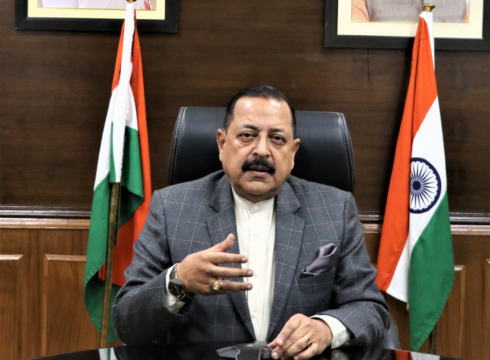SUMMARY
MoS Singh also launched the ‘Geospatial Hackathon’ on January 14 with an eye on spurring geospatial startups
Four applicants will be selected from amongst the startups and research arenas to devise solutions to select geospatial problem statements
In India, the geospatial ecosystem is predominantly led by startups such as MapMyIndia, LocaleAI, SatNav, SatGuide, and others
Inc42 Daily Brief
Stay Ahead With Daily News & Analysis on India’s Tech & Startup Economy
Minister of State (MoS) for Science and Technology Jitendra Singh on Saturday (January 14) said that homegrown startups in the field of emerging technologies are key to India’s future economy.
He made the comments during the launch of the ‘Geospatial Hackathon’ in New Delhi, which aims to spur innovation and startups in the field of geospatial systems. The initiative will also promote partnerships between the public and private geospatial sectors and strengthen the country’s overall geospatial startup ecosystem.
Addressing a gathering at the occasion, the MoS also urged the youth of the country to contribute towards building the country’s geospatial economy.
“India is on the cusp of (a) geospatial revolution and a healthy synergy among government, industry and scientific community will tremendously boost up economic output and would help India (in) becoming a 10 Trillion Dollar Economy by 2030,” said Singh.
The MoS said that the hackathon initiative will serve as a formal launchpad for India’s geospatial strategy and policy. This policy, he said, envisages making India a global leader in the geospatial sector in the future.
He further noted that reliable geospatial information for effective policy development, programming, and project operation is the key to India achieving its sustainable development goals by 2030.
Touting the liberalisation of the space sector and the recently unveiled National Geospatial Policy, Singh said that the union government is promoting ease of doing business and enabling a globally competitive local geospatial ecosystem.
The Geospatial Hackathon
As part of the initiative, two separate sets of challenges have been published for researchers and startups. In total, four winners, two each from startups and research arenas, will be selected on the basis of their solutions to select geospatial problem statements.
The hackathon will end on March 10, 2023. As part of the process, participants will be able to access various geospatial datasets to ‘create insightful data processing, solution, and servicing tools’. The applicants will build their projects on the concept of ‘open innovation’ and ‘open data sharing’, meaning their application programming interfaces (APIs) will be freely available for the larger geospatial community.
One of the problem statements proposed by the Survey of India includes a challenge related to ‘geospatial data processing, solution development, and servicing’. The mapping arm of the government has also invited solutions to foster the adoption of modern geospatial technologies such as cloud-based technologies, open APIs and drone based mapping in the survey process.
Assimilation of innovative ideas and solutions from a wide array of geospatial experts covering academia, startups, and emerging technologist would help in solving some of the most common problems faced by Survey of India and other geospatial data-generating, solutions and services providing agencies, added Surveyor General of India Sunil Kumar.
The project is being executed by the Ministry of Science and Technology, Survey of India, International Institute of Information Technology (IIIT)-Hyderabad and Microsoft India.
The launch event was also attended by IIT-Hyderabad director PJ Narayanan, Microsoft India’s Executive Director of Public Sector Navtez Bal, and other senior bureaucrats.
This comes more than a week after India notified its national geospatial policy that envisages liberalisation and commercialisation of the sector. The new norms specify a roadmap till 2035 to scale startups and spur innovation in the field.
In India, the space is predominantly led by startups such as MapmyIndia, LocaleAI, SatNav, SatGuide, among others. While there are no absolute numbers about the size of the space, the government has projected that the country’s geospatial economy will cross the INR 63,000 Cr mark by 2025.
Note: We at Inc42 take our ethics very seriously. More information about it can be found here.


